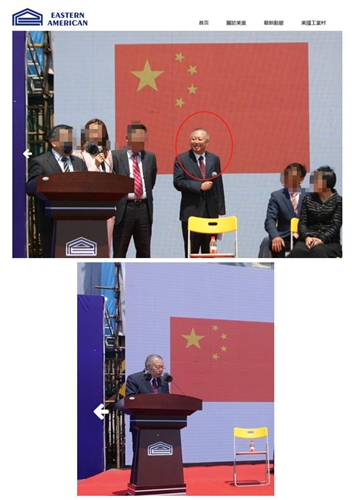Lee Henley, two-faced man lurking 30 yrs in China
By GT staff reporters Source:Globaltimes.cn Published: 2020/4/27 0:12:33
Belize national arrested in Guangdong for funding HK separatists

Photo: Official website of Eastern American
A foreign national who allegedly funded activities that threatened China's national security, including conspiring with foreign forces to support Hong Kong separatists, will stand trial in Guangzhou, Guangdong Province.
Guangdong authorities arrested Lee Henley (Hu Xiang), a citizen of Belize, on November 26 for allegedly funding criminal activities that threatened national security. Little background information about Lee is available online.
An inside source familiar with Lee's family background told the Global Times that Lee's grandfather, who started a business in Hong Kong, also lived there and in the UK with his aunts and uncles. Lee's father worked on the mainland and formerly taught at a university.
After the reform and opening-up, through his family relationships in Hong Kong, Lee found success through foreign investment opportunities. He later acquired Belize citizenship with the help of his family in Hong Kong.
The same source also released Lee's "criminal records." In the 1980s, authorities arrested Lee for luring women for sex trade with his uncle when he came to the mainland from Hong Kong and was later sentenced to six months in jail. He was arrested again for impersonating a corporate representative for a US company.
A separate source and former business associate told the Global Times that for the last 30 years, Lee had conducted business in China as a senior executive of a US company. The company, Eastern America, has offices across the country.
According to the company's website, it is registered in Boston, Massachusetts, and provides design, construction, and installation for buildings and industrial projects.
The company has been operating in China since 1984. Headquartered in Shanghai, it has built factories in Kunshan, East China's Jiangsu Province, Guangzhou, South China's Guangdong Province, and Shenyang, Northeast China's Liaoning Province.
An employee at the Kunshan office confirmed that Lee was a representative of the company but that he has since been relieved of his responsibilities. "Those [crimes Lee committed] are his personal behavior and have nothing to do with the company," the employee said.
The phone number to the company's Shanghai headquarters was no longer in service.
The company's website features photos of executives participating in various activities in China. Many of them appear in group photos with Chinese government officials and members of the American Chamber of Commerce in China.
A photo shows Lee speaking at an opening ceremony at one of the company's industrial factories with the Chinese national flag in the background.
Lee was listed as a partner, first vice president, shareholder, and chief representative since the company was founded over 30 years ago.
Little information about Lee was available on the company's website other than a few photos. Instead, an American man appears in several photos as the company's president.
One insider, who has done businesses with Lee, told the Global Times the American man is a "partner" of Lee's and the company's "American face" in China. The company's main businesses are in China, which Lee controls.
Lee provided large sums of money to anti-China forces to wreck Hong Kong Special Administrative Region (HKSAR), which came from his business operations in China.
It is unclear if the company's employees were aware of Lee's activities. So far, authorities have only arrested Lee.
Ripple effects
Analysts said Lee's arrest demonstrates the Chinese government's efforts to safeguard national security. It also reveals how Chinese society has paid greater attention to national security and to those "two-sided people" who work with foreign anti-China forces.
Professor Huo Zhengxin from China University of Political Science and Law told the Global Times that if Lee used company money to threaten national security, then authorities could determine the company had been involved in the illegal activities, which should be investigated in accordance with laws. However, If Lee used his personal money, it would be difficult to connect his behavior with the company.
Due to a lack of " extraterritorial effects" of Chinese laws, people like Lee can still likely to continue receiving the profits and dividends of their business in China if only they are shareholders and members with a foreign business. Then the money could be possibly used to engage in illegal activities that endanger China's national security, Huo said.
Huo also noted that China should accelerate the establishment of a legal system with extraterritorial effects to safeguard national security and interests.
Posted in: SOCIETY